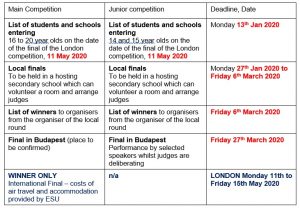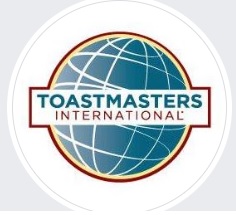The English Speaking Union’s International Public Speaking Competition 2020

HUNGARY FINAL 2020
The final in Hungary and the International Final in London were both cancelled due to the Covid outbreak. It was decided that the 2021 competition would go ahead using a Zoom platform with an international final also online in May 2021.

Theme for Hungary Final: “Think globally, act locally”
The Organisers
The organiser of events for the International ESU in Hungary is the chairman, Steve Jones (steve@singlish.hu). Information on the ESU can be obtained on the website www.singlish.hu. The organiser to whom all entries should be sent and enquiries should be made is Judit Borszéki (borszekijudit@gmail.com). We’ll need to know about all the entries in each school to decide where we’ll need local finals, so please keep to the deadline.
The Junior Competition
The junior competition is for those who are too young to enter the main competition. This gives an opportunity for younger speakers to practise in front of an audience with feedback in a competition situation. Prizes will be awarded. The speech will be of three minutes duration and no questions will be asked. The topic is the same as in the Main Competition.
The Main Competition
The main competition will follow the pattern of previous years i.e. a 5 minute speech (minimum length 4m 30s, maximum 5m 30s) with bell warnings at these 3 times.
Speeches are to be given without ‘props’, displays or other device (If in doubt ask the organisers in Budapest) however the speaker may use prompt cards to indicate the speech point by point. A speech should never be read.
Prizes will be awarded and the winner will also go to the UK for the International competition in London 11-15 May 2020. The winner must be available on these dates.
The winner will spend the whole of the competition week with colleagues from the other 50 or more countries taking part. The ESU Hungary will pay the air fare only. Costs of travel to and from Luton airport will need to be covered by the participant (40 GBP approx.) The International ESU at Dartmouth House will pay the costs of accommodation (bed and breakfast) in the hotel in London and the programme which includes a visit to the Globe theatre for an interactive experience. The ESU will have several staff on duty throughout the week, staying at each hotel, to whom the participants can address any problems. Participants will need pocket money (Recommended 35 GBP per day minimum – 210 GBP total). More or less everything is provided for them during the week.
Please note that the UK exchange rate may well change significantly as the pound is falling at present.
Accompanying adults may travel and stay in the hotels used by the ESU, however, they will not be able to accompany the participants during the week. They may attend the preliminary rounds on Thursday and the final on Friday. Otherwise they will have to occupy themselves and cover their full costs.
A bit of good advice for participants
“Think globally, act locally”
The subject of your speech is of your own choice but based on the title given above. Try to make your speech …
- Of length 5 minutes (minimum length 4m 30s, maximum 5m 30s)
- Supported by crib cards indicating (using single words or brief phrases) the next point
- Without the use of props other than your crib cards
- Personal to you – perhaps with an anecdote or based on your own experience.
- Exciting with a good beginning designed to get the audience’s attention
- Well structured with sound logic and explanations
- In a clear voice at a good tempo with suitable breaks and silences
- Humorous in parts and serious in others
- End in a suitably memorable way – related to the topic and your personal aims
Questions will be asked at the end of your speech so be prepared and know your subject. Try to anticipate questions which might be asked but don’t repeat the question before answering as this may annoy judges. Try to structure your replies clearly.
When preparing all of this, try to get your friends or teachers to question you on your speech so that you can get used to answering the question asked briefly and precisely. Make your answers short and to the point. It will not help your case if you ramble on and around the topic.
There are some things you should try to do:
- Dress in an appropriate manner and make sure you have everything you need
- Try to remain calm throughout the speech
- Use movement to illustrate your speech – but remember too much movement may be distracting
- Identify several people in the audience and direct your speech to them, not to the judges.
- Practice speaking to a group of people and make sure you can be heard clearly
- Answer the person asking the question but remember everyone wants to hear the answer so keep your voice up
- Use appropriate language throughout both the speech and the questions – the use of slang might be part of your speech but should not be part of questioning
- You are not an actor playing a part so keep your speech very much in the realms of reality.
- Try not to talk over the audience – if the laugh etc – but repeat, if necessary, any point which was lost in such audience response
- Make your speech fit the timing precisely. The judges will expect you to finish within the time allocated.
- The end of your speech should be quite obvious – there is no need to thank the audience for listening or for their attendance



We wish to thank also all of the ESU members here in Hungary especially Dora Foster from the host school, Ilona Jobbagy formerly from OUP and now co-ordinating with them and Judit Borszeki who has co-ordinated the entries from the schools and has maintained contact, dealing with the many enquiries and subsequent problems.

